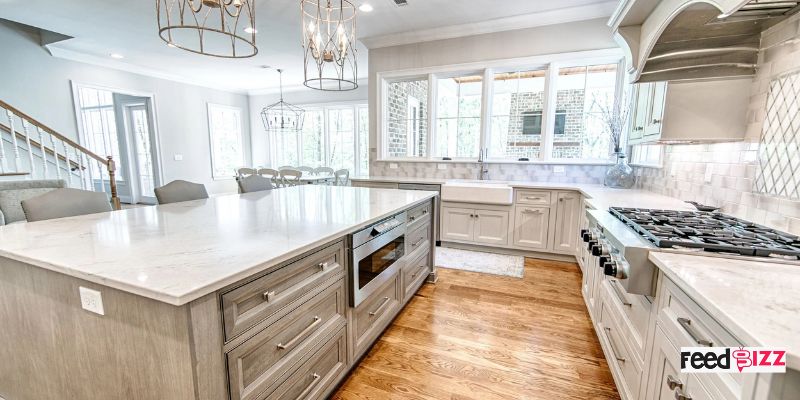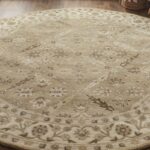When you’re upgrading your kitchen, choosing the right countertop is one of the most important steps. Quartz countertops have become one of the most popular choices in 2025 because of their beauty, durability, and easy maintenance. They’re engineered to last, and they come in endless designs that can match any home style.
But with so many options, it’s natural to feel overwhelmed. Don’t worry—we’ve put together a complete guide to help you understand quartz countertops. From what they are, to their pros and cons, trending colors, prices, and even care tips—you’ll find everything you need here to make the right choice for your home.
What is a Quartz Countertop?
Quartz countertops, also called engineered stone, are made from around 90–95% natural ground quartz mixed with resins, polymers, and pigments. This process creates a non-porous surface that is both strong and stylish. Because they are man-made, quartz slabs come in many colors, finishes, and designs—even ones that mimic natural stones like marble and granite. You can choose everything from sleek solid whites to bold patterns such as blue quartz countertops or dramatic veined styles, making them a favorite option for custom quartz countertops designs.
The Advantages and Disadvantages of Quartz Countertops
Like every material, quartz has its pros and cons. Knowing both will help you decide if it’s the right fit for your home.
Pros of Quartz Countertops
- Extremely durable and resistant to scratches, chips, and cracks
- Low maintenance—no sealing required
- Easy to clean with mild soap and water
- Resistant to stains and bacteria
- Wide range of colors and patterns for every style
- Consistent design across the entire surface
Cons of Quartz Countertops
- Can be more expensive than other options
- May discolor under direct sunlight over time
- Prone to damage from extreme heat—always use trivets
- Large installations may show seams at joint
Quartz vs. Other Countertop Materials
To really understand quartz, it’s helpful to compare it with other popular countertop options.
Quartz vs. Granite
Granite has natural beauty and unique patterns, but it requires sealing and more care. Quartz, on the other hand, is easier to maintain and more consistent in color. While granite can be slightly cheaper, quartz wins in terms of durability and maintenance.
Quartz vs. Marble
Marble is known for its classic elegance, but it stains and scratches easily. Quartz can replicate the look of marble while being more durable and low maintenance, making it a practical alternative.
Quartz vs. Laminate
Laminate is cheaper but less durable. It can scratch, wear out, and doesn’t have the luxurious look of quartz. Quartz, while more expensive, lasts much longer and maintains its sleek appearance.
Trending Quartz Colors and Designs in 2025
Quartz countertops can fit into almost any kitchen design. Here are some of the most popular options this year:
- Calacatta Novo – soft white with thin gray veining
- White Attica – bold white with dramatic black streaks
- White Zeus Extreme – a crisp, pure white for modern kitchens
- Eternal Calacatta Gold – white background with warm gold veining
- Concrete Look – industrial gray tones for a modern style
- Nero Marquina – striking black with white marble-like veining
- Blue Quartz Countertops – cool tones for a unique statement piece
What Affects Quartz Countertop Prices?
The price of quartz countertops depends on several factors. Well-known brands often come at a higher price, while rare colors and intricate patterns can also raise the overall cost. The edge style you choose, such as beveled, ogee, or waterfall, and the difficulty of installation both play a role in final pricing. Custom shapes or unique cuts may increase expenses even further. Simply put, the more premium and customized your selection, the higher the investment will be. If you’d like a deeper comparison, you can learn more about Quartz countertops cost to understand how quartz pricing stacks up against other materials.
Is Quartz More Expensive Than Other Materials?
Yes, quartz generally costs more than laminate or butcher block. But it also:
- Lasts much longer
- Requires less maintenance
- Adds more value to your home
Many homeowners see quartz as a smart investment because it combines beauty and practicality.
Tips for Cleaning and Maintaining Quartz Countertops
Quartz is easy to take care of, but here are some tips to keep it looking like new:
- Clean daily with mild soap and warm water
- Avoid harsh chemicals like bleach or acids
- Wipe spills quickly to prevent stains
- Always use cutting boards to avoid scratches
- Protect surfaces from direct heat with trivets or mats
- For stubborn stains, use a non-abrasive cleaner made for quartz
Things to Consider Before Buying Quartz Countertops
Before you commit, here are a few key things to think about:
- Set Your Budget and Style – Decide how much you want to spend and choose a color or pattern that fits your kitchen.
- Pick the Right Thickness and Edges – Quartz usually comes in 2cm or 3cm thickness. Choose edges like beveled, ogee, or waterfall depending on your style and budget.
- Compare Finishes – Polished, honed, and matte finishes are available. Visit a showroom to see samples in person.
- Get Multiple Quotes and Warranties – Compare prices and make sure your installer offers a warranty.
- Think About Sustainability – Some quartz brands use recycled materials and eco-friendly methods.
Conclusion
Quartz countertops are a blend of strength, elegance, and convenience. They may require a bigger upfront investment, but their durability, design variety, and easy care make them worth it. Whether you want a modern all-white kitchen, a dramatic dark look, or something in between, quartz offers endless options to match your home perfectly.
If you’re ready to choose quartz countertops for your kitchen, take your time, explore the options, and pick the one that fits both your budget and your style. With the right choice, your kitchen will look beautiful for years to come.









